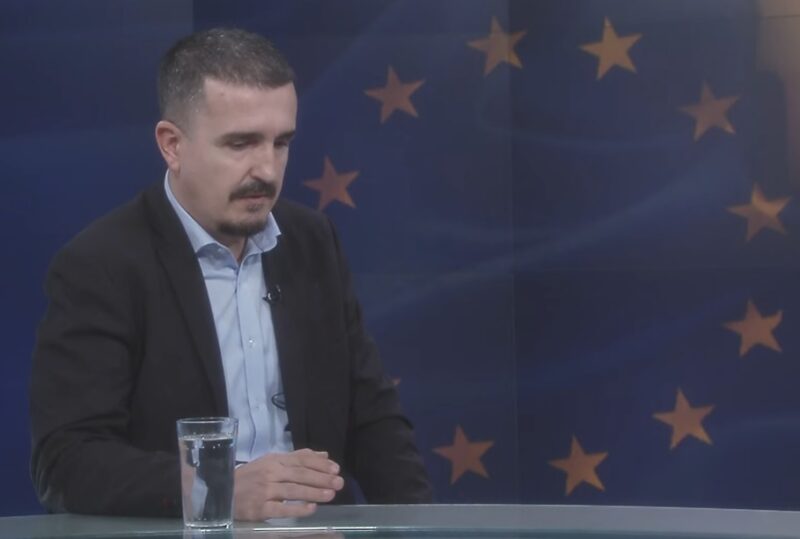If the Government wanted to relativize the inclusion of ethnic Bulgarians in the constitution, VMRO-DPMNE saw another topic there – that of the even more pronounced gradation between the state-forming ethnic groups of North Macedonia, which are mentioned in the preamble of its Constitution as “part of the people”.
Author: Xhelal Neziri
The debate regarding constitutional changes tends to bring up old, politically usable topics in North Macedonia. The obligation for the inclusion of ethnic Bulgarians in the Constitution of North Macedonia can be burdened with other topics, which would fundamentally affect the Ohrid Agreement. If the Albanian opposition parties propose that the term “20 percent” be replaced by the term “Albania/Albanians”, the Macedonian opposition party VMRO-DPMNE asked for the Croatian model of the preamble, where the state would be defined not as the property of all citizens, but as the property of the people Macedonian and other minorities.
The preamble of the Croatian Constitution was initially cited by the Government as an example of its openness to all ethnic groups living in Croatia, including those with completely insignificant percentages. The part where the minorities are mentioned says: “Starting from the presented historical facts and generally accepted principles in the modern world…, the Republic of Croatia is founded as a national state of the Croatian people and a state of the members of the autochthonous national minorities: Serbs, Czechs, Slovaks, Italians, Hungarians, Jews, Germans, Austrians, Ukrainians, Russians and others, who are its citizens, who are guaranteed equality with citizens of Croatian nationality and the exercise of national rights in accordance with the democratic norms of the OUN and the countries of the free world.”
If the Government wanted to relativize the inclusion of ethnic Bulgarians in the constitution, VMRO-DPMNE saw another topic there – that of the even more pronounced gradation between the state-forming ethnic groups of North Macedonia, which are mentioned in the preamble of its Constitution as “part of the people”. So, VMRO-DPMNE wants an exclusive state of the Macedonian ethnic majority, where other minorities would have a certain degree of ethno-cultural rights. With this, Hristijan Mickovski’s party shows that it has not given up on projecting North Macedonia as a home for the Macedonian people, where other smaller ethnic groups would also have a room for rent. An ethnocentric concept of designing the modern political nation, which was abandoned after the Ohrid Agreement signed in 2001.
If this concept has been shown to be unifying for the Croatian political nation, the same is inapplicable in North Macedonia. According to the last census, the Croatian people make up 91.63 percent of the total population, while the largest ethnic group is the Serbs with 3.2 percent. Twenty-one other ethnic groups mentioned in the preamble of the Croatian Constitution are below 1 percent. In North Macedonia, the Macedonian people make up 58.44 percent of the population, while the largest ethnic group are the Albanians with 24.3 percent of resident citizens. Over ten other ethnic groups are below 4 percent.
State building through the construction of the nation in a political sense, leaving almost half of the population as “renters” in the common house, was a mistake that was made in the 90s of the last century. It was then decided that the state of one ethnicity should rise above the multi-ethnic reality, which brought about continuous political clashes that culminated in the conflict of 2001. Therefore, the demand of VMRO-DPMNE is a return to the years of lack of vision and repetition of mistakes. the same with the hope that they will give different results.
The demand for the removal of the “20 percent”, meanwhile, has remained the only ethnic cause for the Albanian parties to seize the trend of modernization. Until now, there has been no attempt to open a constructive debate, on a concrete proposal, to convince the majority of ethnic Macedonian MPs to implement this change. The topic of “20 percent” always comes up where the initiative of constitutional changes is initiated by another factor. It was relevant in 2018, when Greece imposed changes to implement the Prespa Agreement, and now – when Bulgaria demands that ethnic Bulgarians become part of the preamble to implement the French Proposal. In recent years, there have been several moments when both LSDM and VMRO-DPMNE have said that they are ready to vote for the term “20 percent” to be replaced with “Albania/Albanians”. None of the parties challenged them with a concrete proposal, which would be entered into the parliamentary procedure as a consensual project of all relevant political forces.
Constitutional changes in countries with a history of political and ethnic conflict are like mini-invasive surgical interventions, with a clear focus, in order not to produce additional complications. Now these changes are being imposed by the French proposal, approved last year by the parliaments in Sofia and Skopje, which removed the Bulgarian veto on the start of talks for membership in the European Union (EU). The approval of this document opened the way only for the screening process, i.e. the analysis of how well the country’s laws are harmonized with the European ones, but this act did not completely eliminate the risk of the veto returning. More specifically, the continuation of negotiations or the opening of the first chapters is conditioned by the inclusion of ethnic Bulgarians in the Constitution. And for this, 80 out of 120 deputies are required, which the current government does not have. This makes VMRO-DPMNE a key factor if the country will be able to fulfill the key obligation from the French Proposal to continue the European path, or restore the Bulgarian blockade.

